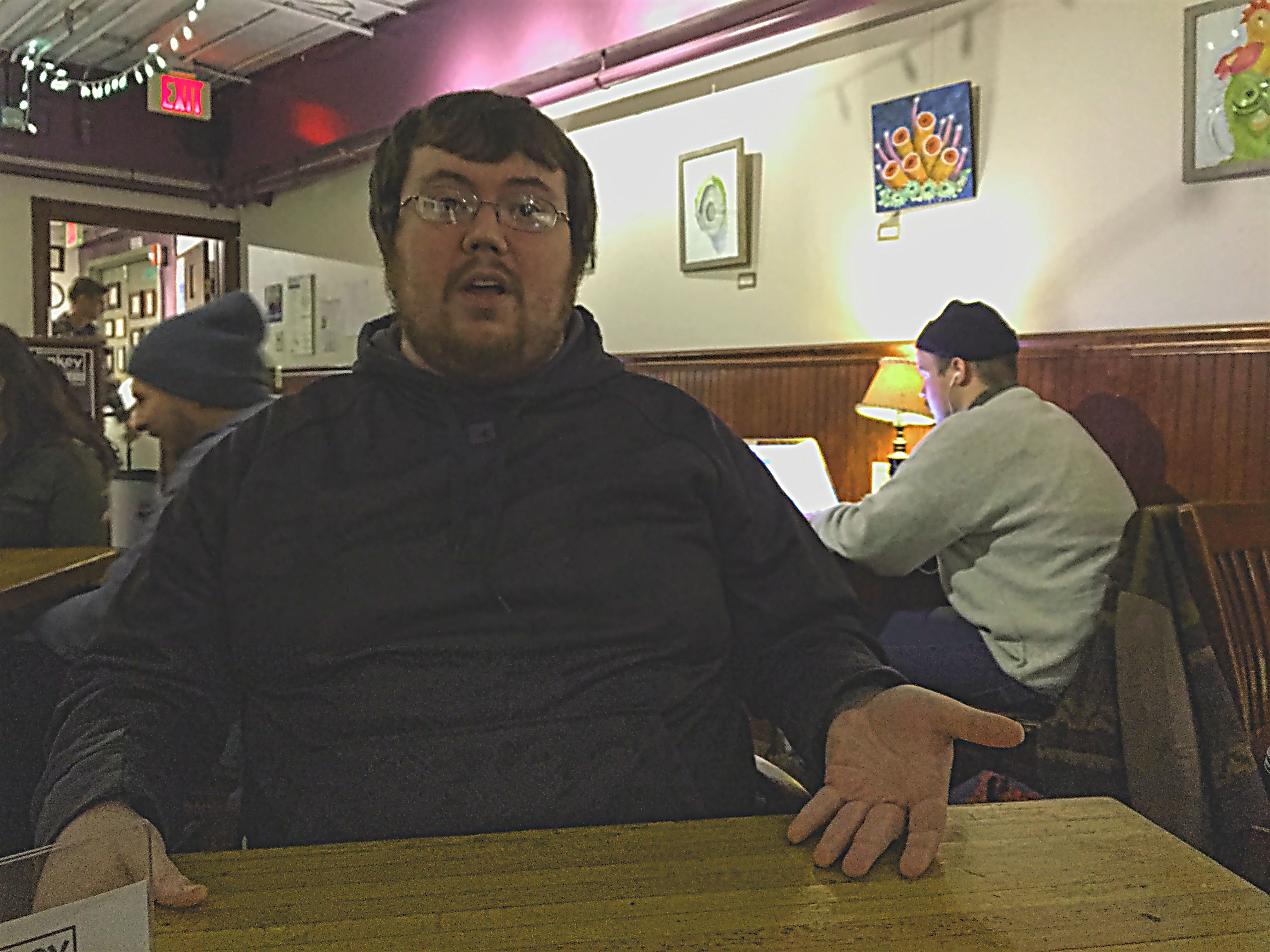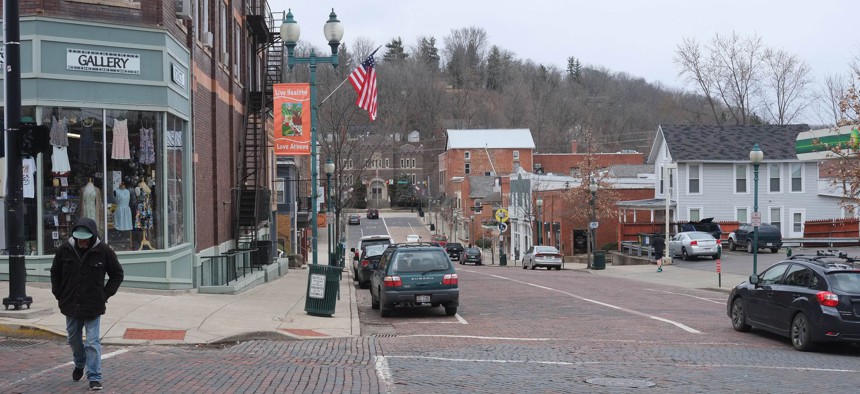Connecting state and local government leaders
Daniel Rupert’s story of trying to find stability is not uncommon. "I had nothing. I had a duffel bag on my back and that was it.”
ATHENS, Ohio — For around 18 months in his early 20s, Daniel Rupert was homeless in this southeastern Ohio college town, living out of a large duffel bag, spending his days at the local library and spending his nights in a tucked-away part of the alley behind Chipotle, in nooks or stairways on the campus of Ohio University or close to exterior heating vents near public buildings.
“You learn pretty quickly that vagrancy is frowned upon,” he told Route Fifty in an interview late last month. Rupert, now 28, had already used up his 90-day allotment at the local Timothy House shelter for people experiencing homelessness.
He was in the process of applying for housing through the U.S. Department of Housing and Urban Development, but he had no place to go, and when he couldn’t couch surf, he was on the street. It took years for Rupert to find his way to consistent food, shelter and employment.
Rupert’s story is not uncommon: He spent most of his childhood from age three on jumping from foster home to foster home, in and out of various programs. Rupert lived in Chillicothe, Ohio, for over three years with one family who had also been fostering his sister.
At age 10, however, they adopted her but not him, so he went back into the system. At age 12, he was placed with the Sojourners Care Network based in McArthur, about 25 miles west of Athens.
Sojourners is a nonprofit that provides foster care, runaway and homeless youth services, serving Appalachian Ohio, Kentucky and West Virginia.
“I started in a home, and whenever I ended up causing a scene or being too much of a hassle they placed me in a different home because I was a bit of a pain in the butt,” Rupert confessed. “My way of doing things was, if I couldn’t figure out a way to solve a problem, if I didn’t like the way things were going, I’d make a scene until I got moved. That carried on for a long time.”
Rupert bounced around a lot for a short period of time—about six homes in two years. After finding one stable foster family, he began to have problems with peers in school, getting into fights.
“I decided to quite literally run from the problem, run away from the foster home,” he said.
Rupert finally found a foster family who helped him finish high school and set him up to attend the Ohio University branch campus in Chillicothe.
“But financial aid got screwed up, so that starts the entire period of being homeless,” he said. Rupert had aged out of the system, as happens with many children who bounce around in foster care.
And he had no support network of family to fall back on when times got tough. The local job and family services set him up with an apartment for two months, expecting financial aid to pay for it after that. When financial aid didn’t come through, he had to drop out. Unable to find a job, Rupert ended up squatting in that apartment for several more months.

“I was job hunting, but had no luck,” he said. After being kicked out, he went to stay with a former foster parent, but wasn’t allowed to stay after it became clear Rupert wasn’t straight.
“I was homeless from there on. I had nothing. I had a duffel bag on my back and that was it,” he said.
He began his period of homelessness in Athens, for 18 months sleeping in alleys and alcoves or on couches when he could find them, and spending his days in the library. Eventually, HUD came through. Rupert got a job, and he found some measure of stability, though he is currently looking for work again.
Major Challenges for Struggling Youth in Appalachian Ohio
Aging out of the system like Rupert did is not unusual. Youth homelessness, especially in the LGBT community, is a major issue in the United States, including Ohio. Since 2009, the number of children in Ohio’s child welfare system has increased by about 19 percent, while agency funding has dropped by 17 percent.
Homelessness among youth often stems from domestic violence, behavioral and mental health issues, and personal safety concerns for LGBT youth. In addition, transition-age youth up to age 24 often encounter a variety of barriers when trying to get help through the traditional adult homeless service system.
High poverty, high unemployment, and the opioid crisis make southeastern Ohio particularly challenging for youth struggling to find a safe place to live.
Youth who have “aged out” of the foster care system are particularly at risk of sexual exploitation and trafficking. A survey by Sojourners found that 95 percent of foster care youth come from families where one or more adults in the home abused substances and all experienced some form of emotional, physical or sexual abuse.
Last month, it was announced that the Coalition on Homelessness and Housing in Ohio was awarded a $2.2 million grant from HUD to implement innovative approaches to help reduce, and hopefully end, youth homelessness in southeastern Ohio.
It is one of only four rural areas in the country to be awarded such a grant. Agencies combating homelessness in Athens, Vinton, Meigs, Jackson and Gallia counties will be eligible for portions of the funding.
COHHIO will serve as the lead agency, with a variety of stakeholders participating in developing a plan for a pilot program to figure out best practices and innovative approaches to combat this problem. Participants will include homeless service providers, schools, child welfare agencies, youth advisory board, the Ohio Department of Education and other community partners.
Rich Games, Sojourners co-executive director, said in a recent interview that he is hopeful that the pilot program will help afford the time and opportunity for different agencies to really coordinate their efforts.
“You have child welfare, which is job and family services and foster care networks and other child welfare services, and you have that system,” Games explained. “Then you have a whole other system, that is runaway and homeless youth. And they traditionally don’t interact.”
With this grant, those two systems will come together to plan to bridge gaps in service.
“Because they’re not connected, young people fall through the cracks,” he said. “We look forward to partnering with COHHIO and other agencies to devise an innovative plan to end youth homelessness in our community.”
COHHIO Continuum of Care Director Erica Mulryan said in an interview last month that the lessons they learn from this pilot project can be applied more broadly throughout rural Ohio and even at the national level.
“We expect any projects that we develop, any new resources we make available as a result of having access to these funds, those projects will exist indefinitely,” she said.
HUD wants to learn through this program the best ways to develop high-quality community planning and coordination that can be replicated in other places, she said.
“That can have a real, meaningful impact on the goals to reduce and end youth homelessness,” she said. “They want to learn about new and innovative ways of providing assistance. It’s an opportunity to impact national policy and the direction the agencies are going. It’s really exciting.”
Rupert advised that the biggest area of need is helping young people in the system develop life skills, job and interview training and financial literacy.
“Being homeless is a traumatic experience,” he said. “If something doesn’t work out, most people have a safety net with family and resources. When you’re homeless and whatnot, you don’t have that safety net. You’re done. You’re scraping by. You need those life skills.”
David DeWitt is a journalist based in Athens, Ohio, and is associate editor at The Athens News and previously worked for The New York Observer’s Politicker.com and Atlantic Media’s National Journal.
(Top photo by Paul Sableman / Flickr via CC BY 2.0)

NEXT STORY: Fire Chiefs Want Exclusion Under Trump Order Blocking Grants to ‘Sanctuary Cities’



